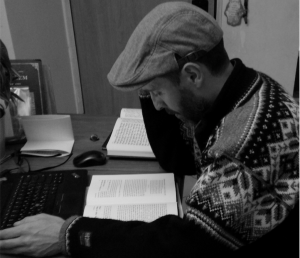Being Vulnerable in a Strong Context
For once I am not going to be addressing here Jewish matters, in the strenuous effort to justify humanistic values, the inevitable presence of the “Other,” and a staunchly iconoclastic conception of the Divine. What I am also not going to do is rant about pseudo-pagan ideas of providence, and conflations of the material and the spiritual. And I am not going to address political issues, or at least not directly – mostly because these days political disputes have become, thanks to the social networks, populated by a plethora of simplistic statements, vague and ironic memes, and 140-character long mantras against this or that. Tired of this lack in dialogue, I closed my Facebook account last year and haven’t regretted once.
What I am going to do is say a few words on vulnerability and the courage it takes not only in being upfront about being vulnerable, but also the utter difficulty in exposing oneself to others. This is always an ordeal, which, as Brene’ Brown has written and argued repeatedly, most people are understandably unwilling to put themselves through. And it is even more of an ordeal in a context in which ethnic and religious clashes are a norm, accompanied by irreconcilable land-claims, political narratives and opposing propagandas. It is even more true in the personal sphere: after all, who wants to be the first one to make a move towards the opposing side, looking for dialogue and compromise? And let me be crystal clear – I don’t expose to all those around me my innermost feelings, my thoughts and my yearnings, because like many others I have had to deal with the consequences of those tokens of my “urge to dialogue” falling into oblivion. It hurts in the personal sphere, and it is excruciating in the collective sphere. So is the solution sucking it up and wearing a thick-enough armor so that this won’t ever happen again, so that we won’t get disappointed by the “other”? No, not really.
“Most of us were raised to believe that vulnerability is the gooey center of the hard emotions that we should work full time to avoid feeling, much less discussing (even when our avoidance causes us and the people around us pain – emotions like fear, shame, grief, disappointment and sadness… To feel is to be vulnerable. Believing that vulnerability is believing that feeling is weakness.”
In order to shield whatever it is that makes us interesting individuals from coming out to the light of day and exposing our innermost weaknesses, an armor is thus devised and given to each one of us – the result is, alas, the reality we all live in. I am of course aware of the fact that all this sounds horribly naïve in a Middle Eastern context – we didn’t start the fire, as Billy Joel would say, but they did. So why should I expose my vulnerability to them, to you? Because, quite simply, that is the only choice – there are no alternatives but that of disengagement. Disengaging from the life of the other, whether a political partner, a neighboring people or a spouse, means to pull back from that person’s life, losing interest in a conscious and voluntary manner in his or her life choices. Lack of engagement is the death of emotions, the detachment from the other, a cut which hardly heals.
So – what is the alternative to disengagement? A balanced investment of interest in dialogue, not despite of but based on vulnerability – both sides are vulnerable in different points, both sides may feel shame, fear, anger, and much more. But addressing all these in an open and mature manner may make things better, exposing weaknesses, understanding them and using them to our advantage, as opposed to hiding them behind fictitious armors, walls, bombs, angry comments, lack of care for the other.
Being vulnerable may be the very opposite to the biblical message “Be Strong and have courage!” but it may also be compatible with it – be strong, expose yourself, be vulnerable and do not fear exposing yourself to the Other. Do not hide – “be here, be you, belong.”
*Yaakov Mascetti holds a Ph.D. and teaches at the Department of Comparative Literature, Bar Ilan University.

